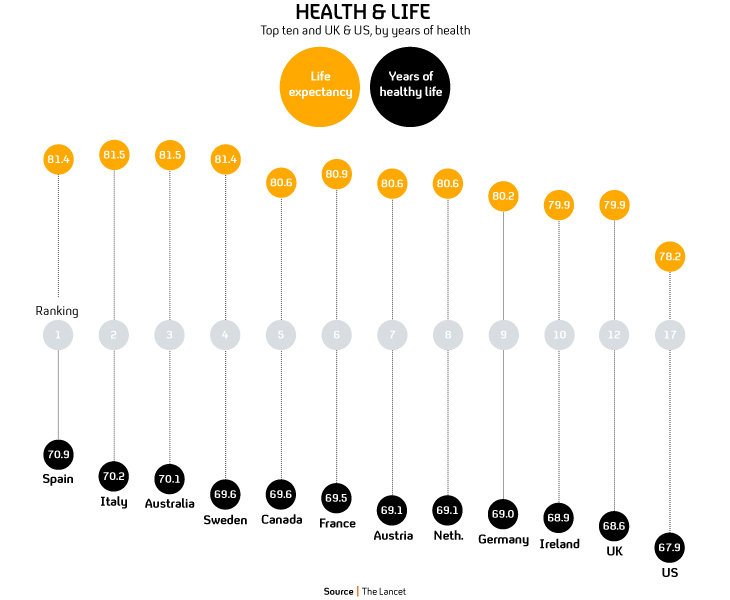Ailing health: why UK is falling behind competitors
Britons are more likely to die early than people in most wealthy nations, according to new research published in the Lancet, and experts fear that the gap is widening.
Britons are more likely to die early than people in most wealthy nations, according to new research, and experts fear that the gap is widening.
A new study by Public Health England and the Global Burden of Disease Study has found the UK is now 14 out of 19 Western countries for life expectancy.
Between 1990 and 2010 life expectancy in the UK increased by an average of 4.2 years to 79.9 years. But the trend masks worrying declines when matched against other nations with similar levels of health care, it is claimed.
The worst offender: tobacco
Heading the list is tobacco, which accounts for 12 per cent of the disease burden, followed by high blood pressure, high body-mass, physical inactivity, alcohol and poor diet. Levels of disability at specific ages had not improved in the UK over the 20 year period, the study found.
There was also a large rise in the number of recorded deaths related to Alzheimer’s.
A ‘wake up call’
Professor Kevin Fenton, director of health and wellbeing at the new Government agency Public Health England (PHE) and co-author, says the report, published in the Lancet, is a “wake up call” for the UK.
He adds: “The reality is that nearly all of these conditions are either preventable or amenable to early intervention, providing opportunities to make a substantial difference in people’s lives, and reduce the tremendous psycho-social and economic burden of poor health on our society.
“Ultimately, in order to really make a difference in improving our nation’s health, concerted action will be required, with individuals, families, local communities, local councils, the NHS and government all taking responsibility and working together towards a healthier population.
“We already have a range of effective tools for individuals, clinicians, and policymakers to respond to these health challenges. We need to apply and scale-up what we know works. And we need the will to make this happen.”
The report compares death rates, disease and health risks in 1990 and in 2010. In 1990 when Britain ranked tenth in a league table – with Alzheimer’s disease, cirrhosis of the liver and drug use disorders being blamed for our falling position.
In these 20 years, life expectancy has increased in the UK – by an average of 4.2 years to 79.9 years – but it has failed to keep pace with other nations. While we are living longer, we are experiencing longer periods of ill health and disability.
Pressure on the NHS
The research was published as Health Secretary Jeremy Hunt prepares to address a “shocking underperformance” that is costing 30,000 lives every year.
Professor John Newton, chief knowledge officer at PHE, said: “These relatively poor results for mortality and disability in the UK require a response at every level and from all responsible authorities. For example, the data on contribution of different risk factors clearly show the need to redouble our efforts on smoking, high blood pressure and obesity. The NHS must pay more attention to prevention and early intervention but the underlying causes often have little to do with health care.”
Public Health England is an executive agency of the Department of Health that is officially due to begin operating on April 1. It was formed after reorganisation of the NHS in England and will take on the role of the Health Protection Agency.
